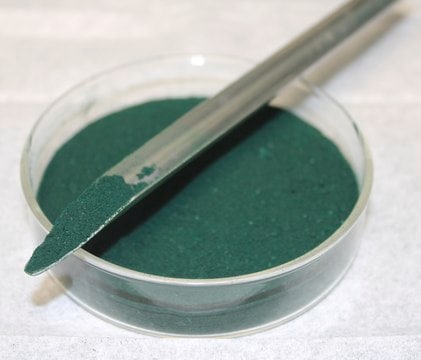Javasolt termékek
koncentráció
≥10.0 mg/mL (UV)
Minőségi szint
technika/technikák
electrophoresis: suitable
fluoreszcencia
λex 609 nm; λem 643 nm in 0.1 M phosphate pH 7.2
alkalmasság
in accordance for gel electrophoresis
tárolási hőmérséklet
2-8°C
Általános leírás
The product is suspended in 150 mM sodium phosphate, 60% ammonium sulfate, 1 mM EDTA, 1 mM sodium azide, pH 7.0 and must be dialyzed against conjugation buffer or PBS before conjugation.
Alkalmazás
C-Phycocyanin (CPC), a pigment-protein complex from the light-harvesting phycobiliprotein family, may be used in immunoassay kit development and to study its properties as a light harvesting protein.
Kiszerelés
Bottomless glass bottle. Contents are inside inserted fused cone.
Analízis megjegyzés
A620/A280 >3.5, A651/A620 <0.3
Tárolási osztály kódja
10 - Combustible liquids
WGK
WGK 3
Lobbanási pont (F)
Not applicable
Lobbanási pont (C)
Not applicable
Egyéni védőeszköz
Faceshields, Gloves, Goggles
Analitikai tanúsítványok (COA)
Analitikai tanúsítványok (COA) keresése a termék sarzs-/tételszámának megadásával. A sarzs- és tételszámok a termék címkéjén találhatók, a „Lot” vagy „Batch” szavak után.
Már rendelkezik ezzel a termékkel?
Az Ön által nemrégiben megvásárolt termékekre vonatkozó dokumentumokat a Dokumentumtárban találja.
Rasiah Pratheepa Kumari et al.
Biological trace element research, 151(1), 59-67 (2012-10-23)
The present investigation is aimed to evaluate the anticataractogenic potential of C-phycocyanin (C-PC), extracted and purified from Spirulina platensis. Enucleated rat lenses were maintained in vitro in Dulbecco's modified Eagle medium (DMEM). Group I contained DMEM, Group II and Group
Michaela Kupka et al.
Biochimica et biophysica acta, 1777(1), 94-103 (2007-11-27)
Optical spectroscopic properties of the covalently linked chromophores of biliproteins are profoundly influenced by the state of the protein. This has been used to monitor the urea-induced denaturation of C-phycocyanin (CPC) from Mastigocladus laminosus and its subunits. Under equilibrium conditions
Jordan M Womick et al.
The journal of physical chemistry. B, 113(48), 15771-15782 (2009-11-12)
The electronic structure and photoinduced relaxation dynamics of the cyanobacterial light harvesting protein, C-Phycocyanin (CPC), are examined using transient grating and two-dimensional (2D) photon echo spectroscopies possessing sub-20 fs time resolution. In combination with linear absorption and fluorescence measurements, these
H Scheer et al.
Molecular microbiology, 68(2), 263-276 (2008-02-21)
Biliproteins are a widespread group of brilliantly coloured photoreceptors characterized by linear tetrapyrrolic chromophores, bilins, which are covalently bound to the apoproteins via relatively stable thioether bonds. Covalent binding stabilizes the chromoproteins and is mandatory for phycobilisome assembly; and, it
Lijin Tian et al.
The journal of physical chemistry. B, 117(38), 11000-11006 (2012-12-18)
Cyanobacteria are oxygen-evolving photosynthetic organisms that harvest sunlight and convert excitation energy into chemical energy. Most of the light is absorbed by large light harvesting complexes called phycobilisomes (PBs). In high-light conditions, cyanobacteria switch on a photoprotective mechanism called non-photochemical
Tudóscsoportunk valamennyi kutatási területen rendelkezik tapasztalattal, beleértve az élettudományt, az anyagtudományt, a kémiai szintézist, a kromatográfiát, az analitikát és még sok más területet.
Lépjen kapcsolatba a szaktanácsadással






